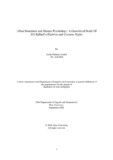Urban Structures and Human Psychology: A geocritical study of J.G Ballard’s Highrise and Cocaine Nights

View/
Date
2020-09Publisher
Brac UniversityAuthor
Ahmed, Syeda NubairaMetadata
Show full item recordAbstract
In postmodern era, the idea of space, its related concepts and practices such as spatiality,
mapping, topography, deterritorialization, and so forth have become a key term for literary
and cultural studies. After the end of the Second World War, space began to reassert itself in
critical theory which critics have termed as the “spatial turn”. The transformational effects of
postmodernism, globalization and other advanced information technologies have helped us to
view space from a different angle. Therefore, this dissertation aims to outline a geocentric
approach towards the perception of urban space and structures, in addition to exploring the
ideas of urban spaces as heterotopic. A geocritical observation of urban spaces has been
critically explored through an in-depth analysis of J.G Ballard’s High Rise and Cocaine
Nights, where the characters’ view regarding their respective urban spaces as well as
structures constantly transformed due to the violence and chaos, they have experienced
within the urban structures they resided in. It also changed their psychological state of living
in a confined structure. Though critics have read these texts as contrapuntal novels, yet they
have not seen it from a geocritical perspective. Therefore, this dissertation attempts to look at
these novels from a geocritical viewpoint and present how confined urban structures affect
the psychology and moral judgement of modern man.
Keywords
Urban Structures; Human Psychology; J.G Ballard’s Highrise; J.G Ballard’s Cocaine Nights; Geocritical StudyDescription
This thesis is submitted in partial fulfillment of the requirements for the degree of Bachelor of Arts in English, 2020.Department
Department of English and Humanities, Brac UniversityType
ThesisCollections
- Thesis, B.A. (English) [621]
